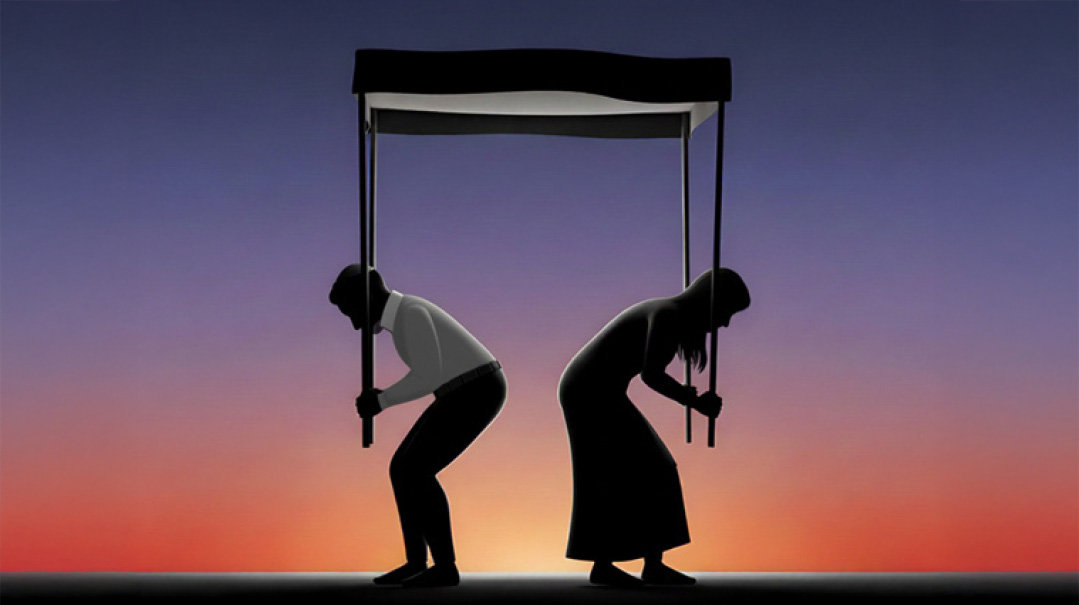Lost Cachet

Maybe it’s time for Israel to reexamine an old, knotty dilemma: Which comes first, the country’s Jewishness or its democracy?

L
ast week, as news of President Trump’s Gulf trip kept filling the headlines, I imagined the State of Israel as a runty kid arriving at the school playground and finding Big Sam, his trusty protector, at the center of a circle of flashy kids plying him with shiny new toys.
“I still like you, Izzy, I really do. You’re a terrific person, very misunderstood, but I get you. Your side of town? It’s been a disaster, a total disaster. Very sad! I hope it gets better over there. Maybe I’ll come by sometime, do a little visit. But right now? I’m over here with this crowd — and let me tell you, they’ve got the most incredible toys. HUGE toys, shiny toys, the best toys. They’re giving me so much stuff — it’s unbelievable! Never seen anything like it. Total winners!”
For years, the America-Israel relationship was understood as an alliance based on something much more enduring than shared financial, military, or territorial interest: It was girded on shared values. Israel viewed itself, and was likewise viewed by much of America, as a small but stalwart model of democratic values in a tough neighborhood. It was a scrappy, shining example of how the American system — spiced with a heaping spoonful of Jewish genius and a dash of Israeli chutzpah — could function and even thrive in foreign soil.
And Israel’s leadership was determined to preserve that shining image, sometimes bending over backward to prove the country’s democratic bona fides. Even when it meant compromising the country’s Jewish values, Israel’s government, judiciary, media, and academia chose to favor its democratic character rather than its own traditions and heritage. After all, its existence as a democratic state was the complement to the concept of American exceptionalism.
According to this concept, America is different and special, and therefore holds a certain responsibility to spread and maintain democracy to the greater world. This assumes, of course, that humanity needs and craves democracy — that the people of the world cannot have a fully free and fully productive future without it.
Many of the post-World War II American administrations, and the school of neoconservative thought, operated on this understanding. Nation-building was a priority, because America’s leadership was sure that the citizens of those benighted, embattled, and very restrictive countries wanted and needed democracy in order to thrive.
Obama shifted away from that mindset. While he avowed that he believed in American exceptionalism with every fiber of his being, his statements and actions — apologies to the Muslim world, a “reset” with Putin’s Russia, a mindset that no one country was more morally fit than another, and his rapprochement with Iran — told a different story. They spoke of an America too flawed to wear the moral crown of leaders of the free world. Who are we, with our historic and current imperfections and injustices, to tell other countries how best to govern? And who needs world leaders anyway? Really, no country should dominate another.
(In hindsight, that attitude likely catalyzed the radical left’s current derision of merit and its fervor to dismantle any sort of “supremacy” — even the supremacy of a democracy that not only gave the world an elevated idea to aspire to, but also paid a heavy price, in blood and treasure, to spread that idea.)
When Trump entered politics, he presented almost the exact opposite mentality. America was the greatest nation, with the best weapons, the best people, the best everything. He would invest in the space programs, the submarines, and the parades it deserved. An even stronger military. A pre-inauguration event at the Lincoln Memorial with country music stars singing in cowboy hats. A promise to restore America to its place as the planet’s undisputed superpower.
But his jaunt through the Gulf States last week suggests that Trump does agree with Obama on at least one thing: He doesn’t see it as America’s role to export the democratic idea to others. As he explained during his Riyadh speech, all those nation-building efforts were pointless and unnecessary — because Riyadh has transformed into an economic, technological, and architectural superpower while remaining its restrictive, repressive, and human-rights-abusing self.
“The gleaming marvels of Riyadh and Abu Dhabi were not created by the so-called nation-builders, neocons, or liberal nonprofits like those who spent trillions and trillions of dollars failing to develop Kabul, Baghdad, so many other cities,” he told an admiring audience of local sheikhs and visiting tech moguls. “Instead, the birth of a modern Middle East has been brought by the people of the region themselves, the people that are right here, the people that have lived here all their lives — developing your own sovereign countries, pursuing your own unique visions, and charting your own destinies in your own way.”
Trump is right that America’s recent round of so-called nation-builders didn’t succeed much at building, and that it’s dangerous for naive Americans to intervene in complex sociopolitical systems older and more entrenched than the history of the United States. There is a lot of truth in his observation that imposing outside solutions on a preexisting system is foolhardy and often fails — truth for parents, for mechanchim, for do-gooders, for wannabe agents of change and improvement.
At the same time, it’s interesting to note the president’s sole measure of success: prosperity. The way he presented it, a nation that manages to put up lots of impressive skyscrapers and integrate into the modern world of high-stakes commerce will automatically (and magically) drop any nasty habits of religious fundamentalism, support for terror, and tribal strife. In his (or his speechwriter’s) elegantly alliterative words, Saudi Arabia’s MBS and other Gulf State leaders are “transcending the ancient conflicts and tired divisions of the past and forging a future where the Middle East is defined by commerce, not chaos, where it exports technology, not terrorism, and where people of different nations, religions, and creeds are building cities together, not bombing each other out of existence.”
Despite the diametric differences in Obama’s and Trump’s worldviews and styles — whether it’s America the Flawed or America First — both seem to result in a diminished role for America as a beacon of freedom. And that means a much shakier reality for Israel, which has long considered itself that reliable if runty buddy whose very existence proves why America is democracy’s gift to the world.
Under Obama’s “what’s so great about our democracy anyway” doctrine, Israel was snubbed and diminished. In Trump’s transactional reality — “if you have lots of money to invest in us, we’re not going to judge how you measure up to our democratic ideals” — Israel is that hapless kid in the playground who’s lost his cachet with the big guy. For all its tech know-how and startup marvels, Israel just doesn’t have the billion-dollar baubles to compete with its Gulf neighbors.
As ideals take a backseat to skyscrapers and cold, hard cash, maybe it’s time for Israel to reexamine an old, knotty dilemma: Which comes first, the country’s Jewishness or its democracy? As long as its democratic creds were Israel’s insurance policy, it could justify tilting the scale toward democracy even at the price of its Jewish identity. But maybe now, as each new headline reiterates how alone the only Jewish country truly is, its governing powers might reconsider whether it’s time to favor the ancient principles that provide its cosmic, enduring, and only real value.
(Originally featured in Mishpacha, Issue 1062)
Oops! We could not locate your form.







